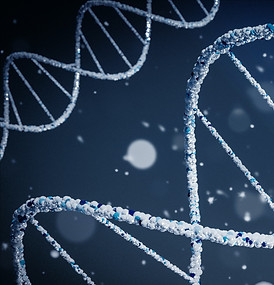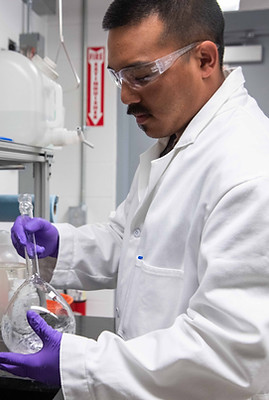




Section 3
Science vs. Religion
As previously mentioned, I am both a believer in science and a believer in God. Some people don’t think the two can be compatible. Either you believe in science or God but you can’t be true to science and still believe in a supernatural being. Or for some, you can’t believe in evolution and still believe in God. I think these are false dichotomies.
Francis S. Collins’s (MD; Ph.D.) who was the Director of the National Institutes of Health (NIH) and led the Human Genome Project, wrote an excellent book on the subject of the compatibility of science and religion: The Language of God: A Scientist Presents Evidence for Belief. In it, he points out that there is nothing inherently in conflict in what science has learned and the idea of a creator God. In fact as noted above, the concept of a creator God seems to fit the evidence of where our universe came from much better than the competing concepts.
Scientists Who Believe in God
For those who think belief in God is incompatible with being a scientist, the following survey results may be surprising:
-
According to a 2009 survey of members of the American Association for the Advancement of Science, 51% believe in some form of deity or higher power while 41% specifically said they do not believe in a universal spirit or higher power. While this is significantly lower than the general population (where 83% believe in God and another 12% believe in a universal spirit or higher power), it still represents a slight majority of scientists who believe in a higher power.[33]
-
Scientists’ belief in God hasn’t changed much since the early 1900’s. In 1914, psychologist James Leuba surveyed 1,000 scientists in the U.S. with 42% reporting they believed in a personal God and an equal percentage who reported they did not. In 1996, historian Edward Larson repeated Leuba’s study which resulted in similar results with 40% saying they believe in a personal God and 45% who said they did not.[33]
So clearly, not all scientists believe that science is incompatible with a belief in God. Let’s examine where the supposed conflicts come from.
Evolution
Evolution is one of the most well documented scientific theories in the history of science and yet there is a minority of Christians and Jews who interpret the book of Genesis literally and believe the earth was formed 6,000 – 10,000 years ago and that humans were fully formed from the beginning.
-
While this does represent a conflict with science, the majority of Christians and Jews believe in evolution and that humans evolved over time.
-
This idea that the earth formed 6,000 – 10,000 years ago (termed Young Earth Creationism) is most typically found in evangelical protestant Christian communities, Mormons, and Jehova’s Witnesses.[34]
-
The Catholic Church, most major Protestant churches, and most of Judaism accept the concept of Theistic Evolution which essentially is that God created the universe and used evolution as the tool to create humankind.[34]
This concept of Theistic Evolution is, I believe, the one that makes the most sense and the one that presents no conflict with the overwhelming evidence of evolution. It also seems consistent to me with the concept of a Creator who is timeless and all-knowing who created the conditions for the universe and life to form and for humans to develop into creatures who have free will, an understanding of right and wrong, and the ability to form a relationship with the loving God who created them.
Naturalism
-
According to Merriam-Webster.com, the definition of Naturalism is: “a theory denying that an event or object has a supernatural significance, specifically: the doctrine that scientific laws are adequate to account for all phenomena.”
-
Livescience.com defines science as: “Science is a systematic and logical approach to discovering how things in the universe work. It is also the body of knowledge accumulated through the discoveries about all the things in the universe. The word 'science' is derived from the Latin word scientia, which is knowledge based on demonstrable and reproducible data, according to the Merriam-Webster Dictionary. True to this definition, science aims for measurable results through testing and analysis. Science is based on fact, not opinions or preferences. The process of science is designed to challenge ideas through research. One important aspect of the scientific process is that it is focuses only on the natural world, according to the University of California - Berkeley. Anything that is considered supernatural does not fit into the definition of science.”
-
Science is absolutely essential to the tremendous progress the human race has made over history in standards of living, health, technology and any number of ways of understanding the universe we live in. As I have noted, I have great faith in science and believe in the scientific method.
-
I also believe that the reason many scientists have trouble in accepting the possibility of God’s existence is stated in the last sentence of University of California – Berkely’s definition (highlighted above) which notes that science focuses only on the natural world. These scientists’ world view is Naturalism. Since God falls outside of the laws of nature, they are unwilling to even consider the possibility that some events, phenomena or beings could be supernatural in spite of some significant evidence to the contrary.
-
I think this is unfortunate because one of the fundamental tenets of science is to follow the evidence without preconceived notions. If your mind is already made up on a topic, are you really willing to fully consider evidence that doesn’t support your foregone conclusion?
Summary
Belief in God and belief in science are not mutually exclusive. As reflected in the significant number of scientists who believe in God and the teachings of many of the largest religious institutions that support evolution and scientific principles, there need be no conflict.
My hope is that those whose world view is Naturalism will recognize that science is the best way to understand the natural world but its tools do not work well to evaluate the supernatural world. But that doesn’t mean that no evidence of the supernatural world exists so I hope those naturalists will open their minds and really consider the evidence of the supernatural (God).
I also hope that those who believe in “Young Earth Creationism” will further explore the teachings of religious scholars who understand the different literary forms the authors in the Bible used to tell God’s story including poetry; symbolism; historical narrative; allegory; apocalyptic form, among others. Understanding the context in which each was written is important for understanding the meaning of each (as opposed to taking each account literally). This quote from CatholicCulture.org illustrates this point[35]:
“The Creation story in Genesis is a good example. There would appear to be no question that the sacred author wants to teach us that the one and only God is the Creator of all things, that man is at the apex of material creation, that man was formed in God’s image and likeness in a way that other created things were not, that our close friendship with God at the beginning has been ruptured by sin, and so on. The formal genre of Genesis seems to be narrative as well. But some of it narrates events that nobody could have witnessed. Is it to be taken literally as a story?
It seems certain simply from reading the text that it is not to be taken literally. After all, there is more than one account of creation in Genesis, and in terms of “factual” content, they are not the same. Moreover, certain features are clearly symbolic, such as the tree of knowledge of good and evil, for it ought to be self-evident that the knowledge of good and evil is not a material fruit that grows on a tree. Because of our inexperience with this form of ancient literature, it is difficult for us to separate the literal from the figurative.”
I believe a deeper understanding of the context each chapter of the Bible was written in (including the literary form used) will alleviate any conflicts with science that “Young Earth Creationists” perceive.
Suggested Reading/Resources
1. Collins, Francis S., The Language of God: A Scientist Presents Evidence for Belief (New York: Free Press, 2006).
Amazon link: https://www.amazon.com/Language-God-Scientist-Presents-Evidence/dp/1416542744
2. Lamoureux, Denis O., Evolution Scripture and Nature Say Yes! (Grand Rapids, MI: Zondervan, 2016).
Amazon link: https://www.amazon.com/Evolution-Scripture-Nature-Say-Yes/dp/0310526442




